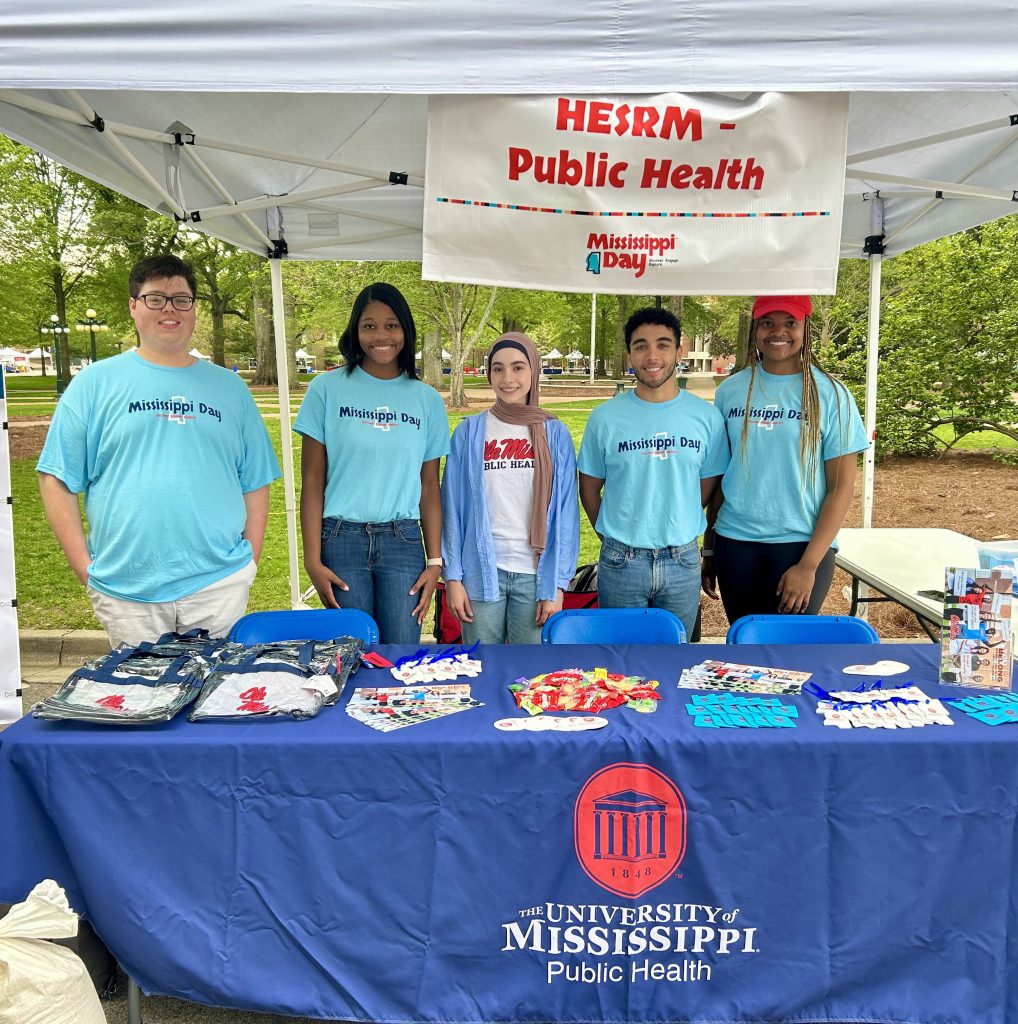
Dylan Barker (left), Libby Mitchell, Zynub Al-Sherri and Autumn Robbins, all Ole Miss students and members of the University of Mississippi's Public Health Association, show off promotional items for a breast cancer awareness campaign. Submitted photo
Undergraduate, master’s-level courses scheduled in new Department of Public Health
by Edwin Smith
The University of Mississippi is addressing the growing need for public health professionals in the state through two degree programs in its new Department of Public Health in the university’s School of Applied Sciences.

Both the bachelor’s and master’s programs are designed to cultivate a skilled workforce capable of tackling Mississippi’s pressing health challenges, said Allison Ford-Wade, interim chair and professor of public health. The department also offers a minor in public health and a joint Doctor of Pharmacy-Master’s of Public Health program with the School of Pharmacy.
“Upon completion of our public health programs, if our students further their education to become physicians, dentists or nurses, they will be geared with public health knowledge,” she said.
The new programs should help fill the state’s public health needs, said Dr. Daniel Edney, executive director of the Mississippi State Department of Health and state health officer.
“The success of our state, both socially and economically, depends on the health of our people,” Edney said. “These new degree opportunities will equip a new generation of workforce to carry out the mission of the MSDH to protect and advance the health, well-being and safety of everyone in Mississippi, without exception.
“We have already made positive strides to get our state off the bottom of national health rankings and are encouraged these opportunities at UM will keep us moving forward.”
The university first considered adding the programs in 2018, Ford-Wade said.
Ole Miss administrators increased their efforts to launch a public health degree program following the COVID-19 pandemic, said Hannah Allen, assistant professor of public health.
“The pandemic highlighted the already existing gaps between health research, policy and practice,” Allen said. “We need more public health professionals in this state who are able to conduct sound research on pressing health issues and then be able to translate their findings into evidence-based programs and policies.
“Without people trained in public health and health communication, the knowledge we have is not getting to the leaders and communities of Mississippi.”
The programs’ launch comes at a critical time, given that Mississippi recently ranked last for women’s health and has increased rates of methamphetamine and other substance use, and low rates of vaccination, especially for HPV.
“Our program highlights the challenges and solutions that future public health practitioners can face and implement equitable changes for at-risk populations,” said Andrew Yockey, assistant professor of public health. “I think really highlighting the structural determinants of health framework would boost educational initiatives, research opportunities, and get students involved in public health.
“Our program takes a multi-faceted approach towards health equity and starts to address these gaps by providing experts from public health, epidemiology and health equity.”

UM is the only university in the state that offers a master’s program where students have the option to complete two concentrations – epidemiology and community health – in 18 months, Ford-Wade said. Programs at other universities focus on other areas, such as nutrition or health policy.
“I believe we are the only community health program,” Ford-Wade said.
The bachelor’s program offers specialties in health science and community health. The community health track will prepare students to work with state, federal or nonprofit health organizations, such as the American Cancer Society.
The master’s degree will enable students to work in a range of public health careers from community health education, epidemiology, preventative medicine and population health to such areas such as social, environmental and health policy.
“We have concurring degree program through the GradSHARK Launch Program for Accelerated Advanced Degrees, where students can complete their bachelor’s in public health and MPH in five years,” she said. “Participating in the GradSHARK Launch PAAD can save students time and money as they complete their advanced degree.”




Public health must focus on nutrition first instead of an area of concentration.
Obesity is the root of chronic illness in Mississippi and the nation . Personal accountability for health behavior choices is key to improving the health of Mississippi , as well as exercise .
Chronic illness continues to increase in the state with the number of prescription drugs on the rise . Undiagnosed hormone issues coupled with poor food choices and lack of exercise, are at the forefront of Mississippi’s health problems. Public health programs and the medical community must be the example and practice what they preach.
If public health professionals and nurses are obese and not exercising … the population will be less likely to change their health behaviors.
COVID vaccinations have been linked to serious side effects and deaths across the globe . Public health cannot be an extension of big pharma who profit billuons , while US health declines . Some vaccines and prescriptions are not the answer to improved public health but the opposite . Health responsibility begins with the individual and is your greatest asset .